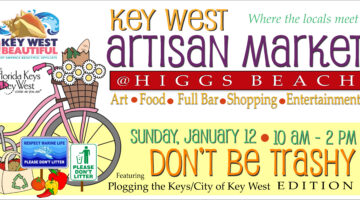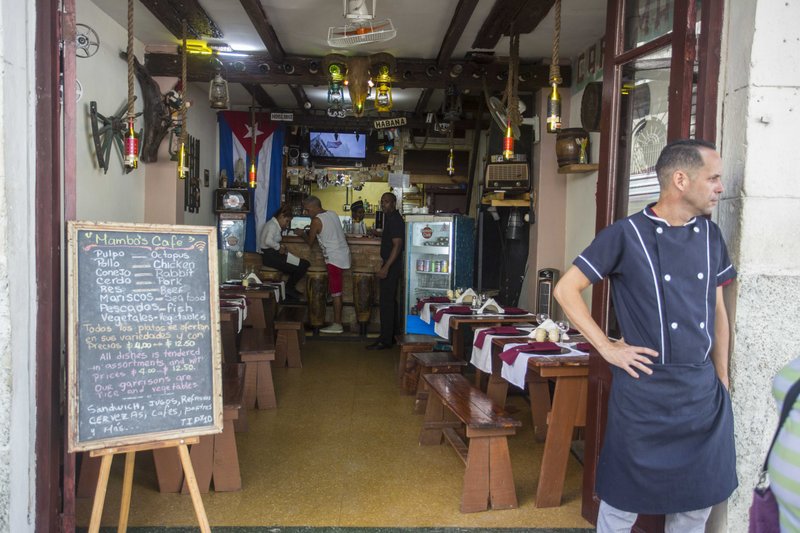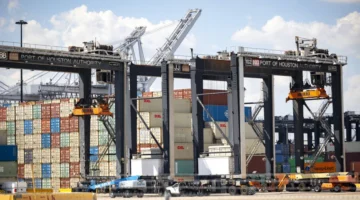US travel warning troubles Cuba’s small-business operators
HAVANA (AP) — A U.S. State Department travel warning for Cuba following mysterious attacks that harmed nearly two dozen American diplomats has come like a bucket of cold water for the aspirations of thousands of private entrepreneurs on the island.
Amid a sudden diplomatic thaw between the Cold War foes that began in 2014, many Cubans invested heavily in privately run restaurants, homestay B&Bs and cars to operate as taxi cabs in hopes of cashing in on an expected boom of American tourists.
But now entrepreneurs worry Americans will be frightened away — even though there has been no word of any tourists affected.
Nowhere are such fears more pronounced than in Old Havana, where many Cubans bought into a hot real estate market as part of a proliferation of B&Bs catering to the hordes of tourists who stroll its cobblestoned streets each day.
“We got to work opening businesses, bars, restaurants, rental homes, and many people invested everything we had, and even borrowed,” said Yunaika Estanque, the 51-year-old owner of a three-room hostel.
Estanque partnered with her parents and two children. They all sold other properties and sought additional financial backing from a friend who lives overseas, and two years ago bought a rickety colonial home steps from the Bay of Havana.
Today it has been spruced up and reborn as the Mi Tierra (My Land) hostel, whose polished vintage floors, warm pastel walls, republican-era furniture and modern air conditioning make for attractive and affordable digs at just $35 a night per person plus $5 more for breakfast.
Mi Tierra opened its doors about two months ago and has received mostly European travelers so far, but it’s Americans that Estanque truly has in mind long-term.
“American tourists consume a lot and leave good tips,” said Estanque, who speaks English and uses it with guests to make them feel welcome. “Now there is going to be a lot of supply, but relatively little demand.”
In addition to the travel warning announced Friday, the State Department also said it was reducing by about 60 percent its diplomatic staff at the U.S. Embassy in Havana and indefinitely suspending visa processing in Cuba. On Tuesday, Washington went further, expelling 15 Cuban diplomats to protest Havana’s failure to protect American envoys from the attacks, which have not been explained.
The United States has not accused Cuba of being behind the attacks. President Raul Castro’s government has disavowed any culpability and called the U.S. response “reckless,” ″hasty” and politically motivated.
Tourism is an important source of badly needed foreign currency for Cuba, one of a handful of key sectors that keep its weak economy sputtering along.
Last year about 4 million travelers visited the island, according to government statistics. That included 281,000 Americans, up from just 91,000 in 2014. There were also 400,000 visits last year by Cubans living overseas, the vast majority of whom reside in the United States.
U.S. tourism to Cuba is still small compared with the numbers already coming from Canada, Europe and elsewhere. But analysts have predicted that if the U.S. embargo on Cuba were to be lifted entirely, 1 million or more American travelers could inundate the island on an annual basis.
It’s too early to tell how significantly American tourists may be discouraged by the State Department warning. Nevertheless, people with skin in the game are watching closely.
With the increase in American travelers in the last three years, “there was a positive effect and a desire to improve the level of services, of quality,” said Martin Payne, a Briton who lives on the island and represents a U.K. tour agency. “With this (possible) decrease, we’ll see if the momentum continues or if a fall is on the way.”
“A lot of people wanted to come to Cuba before the American avalanche. … The Europeans are going to say, ’Well, (now) we can wait, there’s no rush,” Payne added. “It will go on the list to visit in the future.”
Measures announced by U.S. President Donald Trump in June had already sought to limit American travel to Cuba somewhat by barring so-called people-to-people educational trips outside of those run by licensed operators.
Despite assurances that the goal was to support Cuba’s burgeoning class of independent entrepreneurs, those measures were seen as likely to steer U.S. travelers away from privately run B&Bs and restaurants and toward the government-run hotels and eateries that have larger capacity and long-established relationships with tour operators.
If tourism suffers it would add to a list of other economic woes in Cuba, which had its energy grid and agricultural sector hammered by Hurricane Irma. Venezuela, Cuba’s most important ally and commercial partner, is in the throes of a far more severe economic crisis and has been forced to cut back oil shipments on terms seen as preferential for Havana.
Many who depend on the tourism industry say they already noticed a lull in September, when the hurricane hit, after several years when suddenly it seemed the high season was lasting year-round.
“We live off tourism, and right now my household income comes from this taxi,” said Alejandro Sito, a 25-year-old cabbie who was waiting for fares in front of a hotel in the capital.
“How are we going to support ourselves?” asked his colleague, 34-year-old Angel Hernandez. “It’s going to get tough for us.”
___
Andrea Rodriguez on Twitter at www.twitter.com/ARodriguezAP
[livemarket market_name="KONK Life LiveMarket" limit=3 category=“” show_signup=0 show_more=0]




No Comment